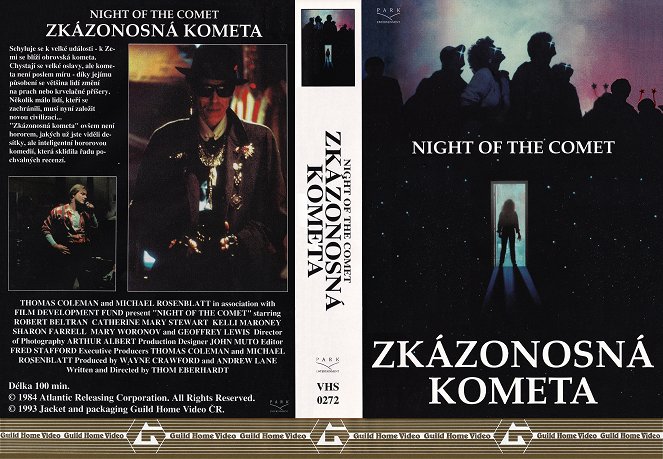Reżyseria:
Thom EberhardtScenariusz:
Thom EberhardtZdjęcia:
Arthur AlbertMuzyka:
David CampbellObsada:
Catherine Mary Stewart, Kelli Maroney, Robert Beltran, Mary Woronov, Geoffrey Lewis, Sharon Farrell, Michael Bowen, Devon Ericson, Janice Kawaye (więcej)Opisy(1)
A huge comet passes near earth, vaporizing nearly the whole planet. Only a few teenagers, who were inside a steel movie projection booth, survive while all those outside are turned to dust. There exists, however, a small group who were exposed to the comet's radiation and are now hideous, blood-thirsty zombies and they begin a deadly hunt for the last remaining humans. (oficjalny tekst dystrybutora)
(więcej)Recenzje (2)
The American movie Night of the Comet plays a lot on the fact that this is a comedy, which on the one hand is great because the 80s elements stand out, although, on the other hand, it is quite a problem because you realize that there is nothing more to it than those 80s elements. And that is a great shame. It is very much in the style of John Carpenter, although it is just not that good.
()
The lamentations of the elderly that culture only goes around in circles and that we have seen it all before can mostly be taken merely as senile mutterings and clinging to a time that has long since passed. But maybe the old folks have a point after all. Today, film publicists sing the praises of movies and filmmakers who approach the heritage of 1980s pop culture with a sense of detachment or mere nostalgia and make clever pastiches out of its various elements. Characteristically for a world that lives only for the current moment, these films are often highly rated because they make a positive impression on those publicists who come from the ranks of film fans weaned on the respective reflected culture, but no one stops to consider whether those films can survive past the period of their own hype. The now forgotten Night of the Comet, which was enthusiastically received and positively reviewed in its time, can serve as an answer to this question. With it’s concept, it seems like a work of the present day, as we have here a fictional world reflecting pop-culture inventions that the film’s creators share with their audience, and there are also references wrapped up in an exaggerated narrative combining different genre conventions and ridiculing their formulas. However, the difference here is that Night of the Comet, like some other eighties movies (e.g. Night of the Creeps), looks to the B-movie genres of the 1950s, which had nurtured an entire generation through frequent airings on television in the 1960s and ’70s. In terms of the sophistication of its allusions, however, Night of the Comet is not in any way comparable to the films of today. Like Scott Pilgrim and all kinds of other young men behind the counter, the heroine here works in a temple of commerce and pop culture, specifically a single-screen cinema showing trash films, and the greatest value in her life consists in achieving the highest score on an arcade game in the lobby. In that sanctuary of decadent culture is where she survived the disaster that turned most of humanity into dust and turned the remaining people into photophobic bloodthirsty beasts, and it is from that sanctuary that she later emerges into a world that no longer has the form of an inhospitable reality offering zero prospects, but is instead a genre universe where anything goes and where “girls just want to have fun”. In addition to the constituent quotes and references, the frame of reference comprising 1950s trash culture is absolutely materialised in the climax, when the characters themselves are stylised into a family of the atomic age and figures from youth films that appeared at the end of that decade. At first glance, the film may give the impression of being a gender-progressive work when it establishes sexually active girls who know how to handle guns as the main characters, but their roles in the narrative nonetheless make it clear that this is a product aimed entirely at a male audience. The film’s sexism becomes apparent in a particularly absurd light, when the rule established by Alison Bechdel is applied. Though the main characters are two sisters who have survived the apocalypse and are now enjoying their freedom after the fall of conventional society, they never talk about anything other than men. Both of them are basically defined by men (their father taught them how to use guns) and are incomplete without men. In order to avoid threatening the status quo, neither of them will ever shoot any man, regardless of how great a threat the given man may be to them. The privilege of having power over life and death is again held only by men, specifically the bruiser who is the object of the main characters’ desire, but also the bad guys, who kill their lackeys rather than let them fall into the heroines’ clutches.
()
(mniej)
(więcej)
Galeria (18)
Photo © Guild Home Video

